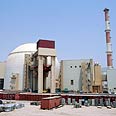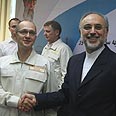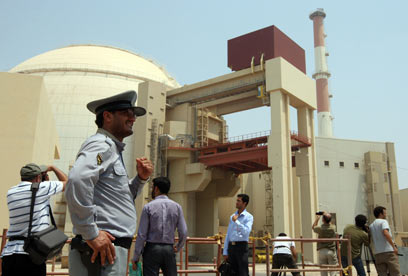

The move evoked a protest and expression of concern on Israel's part, but according to the experts, the Iranians would find it difficult to deceive the Russian inspectors and use the facility's nuclear waste to create a bomb.
Nonetheless, it will take several months before the reactor starts producing electricity. The Russians are expected to continue examining the site in the future as well, while making certain that Iran will not use the nuclear waste to create an atom bomb.
Dr. Ephraim Asculai, a senior researcher at the Institute for National Security Studies, explained to Ynet that even if the Iranians wanted to use that waste to develop a weapon, it won't be simple to deceive the Russians.
"Fuel is not something you put in and remove easily. One-third of it will come out a year later and this is done under full supervision," he said. "It's a complicated operation which takes several dozen days, and the inspectors and the Russians will naturally be there."

Reactor inaugurated in Bushehr. 'Doesn't testify to Iran's ability' (Photo: AFP)
According to Asculai, "Even when the fuel is outside the reactor, you need a big separation plant. It's a long, complicated and dirty chemical activity, and at the moment there are no signs that Iran is building such a plant."
In accordance with the agreement signed between Iran and Russia, Moscow will provide Tehran with the nuclear fuel and get in back later under the supervision of the International Atomic Energy Agency (IAEA).
'Russia wants to control nuclear neighbor'
But who will guarantee that the Russians indeed prevent Iran from using the nuclear waste for military purposes?
According to Prof. Amnon Sela of the Interdisciplinary Center in Herzliya, "Russia has no interest to turn Iran into a military nuclear country. They are too close to Iran geographically, and Russia has no need to have an uncontrollable nuclear neighbor."
Sela explained that apart from the money Russia is getting for the Bushehr reactor project, it is also using its involvement to gain power as a mediator in the ayatollah regime's nuclear activity on behalf of the United Nations and the world.
At least in terms of the diplomatic battle against Iran, Israel appears to be a lone voice. Russia, whose interests are clear as the country supporting the reactor, has stressed in recent days that it would help keep Iran away from nuclear activities aimed at producing a weapon, and the United States admitted Saturday that the reactor was not a proliferation risk.
US State Department spokesman Darby Holladay stressed, however, that the reactor "underscores that Iran does not need an indigenous enrichment capability if its intentions are purely peaceful." Tehran has been claiming all along that it is enriching uranium in its nuclear facilities in order to provide nuclear fuel for its future reactors.
And yet, Dr. Asculai believes that the Bushehr reactor fails to strengthen the Iranian stand, that its nuclear program has peaceful purposes. "This project stands for itself and is not related at this stage to any other project in the Iranian nuclear lineup," he said.
Iran will likely use its first nuclear-related achievement for its own needs, but according to Asculai, this is in fact a Russian achievement, as Russia is the country operating the reactor. "This proves nothing in terms of the Iranian control of nuclear capabilities," he stressed.
- Follow Ynetnews on Facebook















